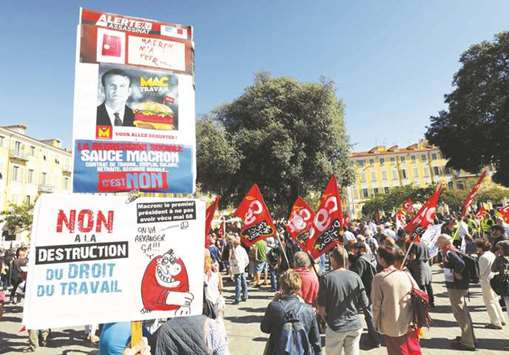In Paris, protesters lit flares and carried banners reading “Withdraw All Decrees”, a call for Macron to drop the measures, which will give companies more power to set working conditions.
The protests challenge the president’s ability to push through reforms that are being closely watched in European capitals – Berlin in particular.
But they are also a test of union strength at a time their influence appears on the decline.
The head of the CGT union spearheading the street protests said that public anger was mounting and warned workers the “corporate bosses” would triumph if trade unions failed to pull together.
“When the union movement and workers are divided, it is generally speaking the corporate bosses who win,” CGT chief Philippe Martinez said.
The moderate CFDT union, France’s biggest, and the leftist Force Ouvriere (FO) have expressed disappointment with Macron, who was elected in May pledging reforms to reboot the economy and cut unemployment, but refused to join the CGT protests.
Some 132,000 people took part in protests across France yesterday, the interior ministry estimated, down from 223,000 at similar rallies last week.
Police said the number of protesters in Paris was a third lower, at about 16,000 protesters, though the CGT put the turnout at 55,000.
Macron says that he will not bow to street pressure.
The centrist government is due to enact the labour reforms today before embarking on other, potentially more explosive changes.
Those include a revamping of France’s employment insurance and pension systems.
Macron angered workers and leftist opponents when he recently said that he would not cede ground to “slackers”.
Rivals were swift to paint the president as a champion of the wealthy and big business.
“He wants to rally behind him influential people, rich people, those that have and consider the rest of us to be a confused mass of savages,” Jean-Luc Melenchon, leader of the “France Unbowed” party, said before joining the protest in Paris.
The ability of the unions to shut down swathes of the economy and force ministers to respond is not what it was.
Strikes have become less frequent, less disruptive and less successful.
Companies in France lost 81 days to strikes per 1,000 workers in 2014, compared with more than 300 days in the late 1990s and over a thousand days in the late 1980s.
While the fight against labour reform may be lost, unions plan more protests against the 39-year-old leader’s reform drive.
Truck drivers will strike on Monday before a rally by pensioners on September 28.
Civil servants will take to the streets on October 10.
Melenchon will lead his party’s own protest on September 23.
Macron, whose popularity has fallen sharply since the election, says that he has a mandate to re-shape the economy.
“The next weeks will be critical to determine how much political capital Macron will lose during the protests,” said London-based think-tank Eurointelligence.



